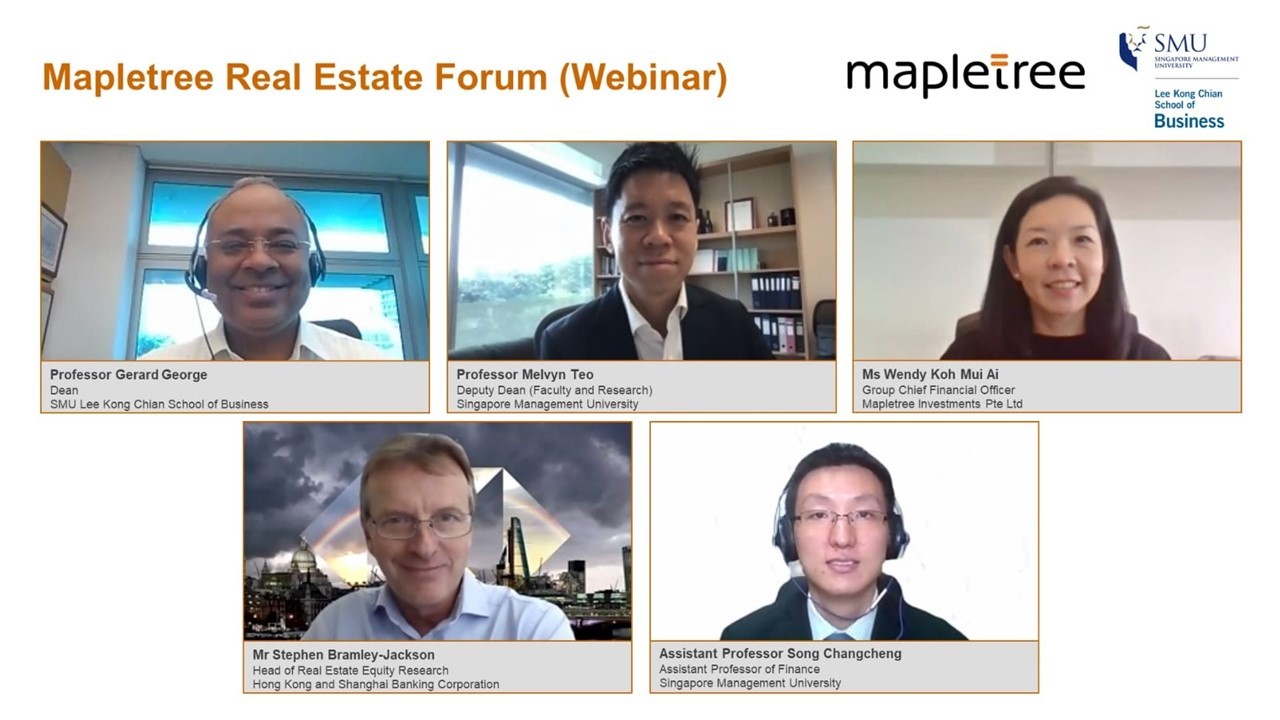
The COVID-19 pandemic has impacted the real estate sector globally. Social distancing and shelter-in-place guidelines have stoked the appetite for residential property located away from dense urban areas. Work-from-home routines threaten to dent the demand for office spaces. The traditional retail sector, already reeling from online competition, now has to confront the challenge of a prolonged shortfall in foot traffic.
At the same time, the pandemic has led to a surge in e-commerce and accelerated enterprise demand for cloud services, with knock-on implications for industrial spaces such as warehouses, distribution centres, and data centres. Which of these changes are cyclical and which of these are structural? What are the opportunities and challenges for the real estate industry?
These were some of the areas discussed at the second edition of the Mapletree Real Estate Forum held on 30 October 2020. More than 360 SMU students, industry professionals, real estate practitioners and members of the public attended the virtual event which was opened by Professor Gerard George, Dean of SMU Lee Kong Chian School of Business (LKCSB).
Participants benefitted from insights from an expert panel comprising London-based Mr Stephen Bramley-Jackson, Head of Real Estate Equity Research, HSBC; Ms Wendy Koh, Group Chief Financial Officer of Mapletree; and SMU Assistant Professor of Finance, Song Changcheng. The panel was moderated by SMU Professor of Finance Melvyn Teo, who is also Deputy Dean of Faculty and Research at LKCSB.
Despite the downward pressure on office spaces in Singapore, experts do not expect significant reduction in office spaces. Ms Wendy Koh noted that the need for more safe distancing areas may coexist alongside for real estate planning. Mr Stephen Bramley-Jackson agreed that offices are likely to remain in demand as developers review fringe locations with the working community needing to minimise commute.
Sharing from the academia’s perspective, Assistant Professor Song Changcheng pointed out that data analytics could help landlords and developers better understand space utilisation.

On the retail front, Ms Koh noted the trend of retailers embracing omni-channel retailing, building both physical and online presence to tap a wider market and strengthen brand awareness. Though e-commerce is highly penetrative and prevalent, brick-and-mortar shops will not go obsolete as retailers strive to integrate both online and physical presence. Location and size of malls will play an even greater role in determining the success of a mall going forward.
Concurrently, the surge in e-commerce has raised the demand for industrial spaces such as warehouses and distribution centres. The rising demand for perishables and essential supplies like pharmaceuticals, as well as companies shifting from a ‘just-in-time’ to ‘just-in-case’ supply chain management have resulted in more stockpiling and hence greater demand for more warehouse space.
Data centres as an asset class is also gaining traction with investors through these Covid-19 times, accommodating tele-commuting arrangements, virtual meetings and online events. The pandemic has also accelerated digital transformation amongst companies. The outlook for the sector therefore remains positive as the economy moves towards a digital one.
Indeed, Internet has become a lifeline in this pandemic. As Professor Gerard George aptly puts it at the start of the webinar, “I am glad that technology has enabled us to virtually continue sharing insights and perspectives with the students and industry leaders.”
The Forum is held annually as a platform for industry practitioners, subject experts and tertiary students to share trends and cross-disciplinary knowledge. It is part of the Mapletree Real Estate Programme, made possible by a generous gift from Mapletree to the University in 2018, and includes the setting up of the Mapletree Professorship in Real Estate, Mapletree Awards, and study trip grants.
Last week, Mapletree also announced a partnership with SMU for its Mapletree Traineeship programme, a 12-month, work-study programme where the company is set to train and employ up to 30 trainees from local tertiary institutions. While the work component offers trainees the opportunity to work on projects involving different business functions within Mapletree, the study component allows trainees to attend curated real estate curriculum by SMU, including courses such as Introduction to Real Estate Economics, Law of Real Estate and Real Estate Investments and Finance modules.
- End -